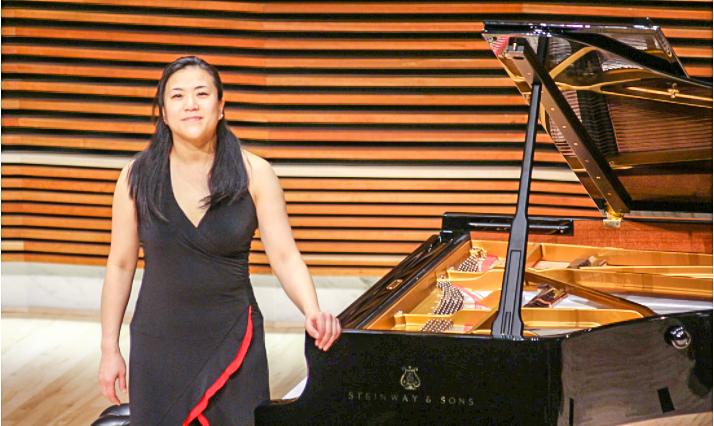Dr. Emi Kagawa on her career
“After I got my doctorate, I had to teach piano to Pre-K students. And they are the hardest,” said Emi Kagawa, DMA, professor of music, remembering how her pupils would become distracted and run around during her lessons, much to her frustration.
“One even peed on the floor,” Kagawa said. “That was probably my lowest moment.”
While that may be one of her lower points, Kagawa has since evolved to balancing a busy and fruitful career as an in-demand concert pianist while acting as a piano instructor to students in the music program at Saint Joseph’s University.
Born in Osaka, Japan, Kagawa began playing the piano at age three, practicing for hours a day under the watchful eye of her parents, both non-musicians.
“I grew up with very strict parents,” Kagawa said. “I know that’s a stereotype, and I know they fit right into the stereotype.”
Upon reaching college-age, Kagawa entered the Kyoto City University of Arts, and upon her graduation, she opted to continue her studies at the University of Colorado at Boulder rather than go to Vienna.
“I was more interested in the United States, more than Europe,” Kagawa said. “It fit my character. And my English was better than my German.”
From there, Kagawa attended the prestigious Juilliard School, and later received her Doctorate of Musical Arts from the State University of New York at Stony Brook.
Kagawa splits her time between St. Joe’s and an active career as a solo and chamber musician, having played at venues including the Weill Recital Hall at Carnegie Hall and the Alice Tully Hall at Lincoln Center, and with symphonies including the Knoxville Symphony Orchestra, which she continues to perform with today.
These achievements are towering to students like music major Daisy Abrams, ’19.
“[When I first met with her,] I was definitely a little intimidated,” Abrams said. “Because I had heard she’s an extraordinary pianist, and that is definitely true.”
Some of Kagawa’s advice has even helped Abrams conquer nervous feelings before playing.
“Something that has helped me a lot with performance anxiety is to do the same thing before performance and practice, whatever that may be, to anchor you into the present moment,” Abrams said. “So I like to breathe three times, and then begin to play. This is a game changer for sure, and I owe that to her.”
Kagawa’s unique teaching style is one that can adjust or even change previous habits, according to Austin Sbarra, ’18, and one component of that style is her use of creative analogies, many involving nature.
“Nature is universal for the most part,” Sbarra said. “Once she told me something like, ‘when you play, think like you’re trying to see the whole thing. Not just one little tree or bird or the pond near it. See all of them and how they all interact with each other.’ Which isn’t just applicable to Beethoven or Bach. It’s a great piece of advice for any situation, to step back and look at all the parts in play and go from there.”
Kagawa herself says that the best piece of advice she received was to trust one’s intuition.
“Trust what your body and mind [are] telling you,” Kagawa said. “Listen to them.”
But maybe Kagawa’s effect on her students can best be summarized in the feeling that Sbarra gets whenever he leaves one of her sessions.
“Every time I leave my lesson, my day is better,” Sbarra said. “I feel like I learned, I got to talk to a friend, I have a clear direction for something I can achieve for the next lesson. I don’t think I’ve ever been in a bad mood after my lesson [with Dr. Kagawa].”















































